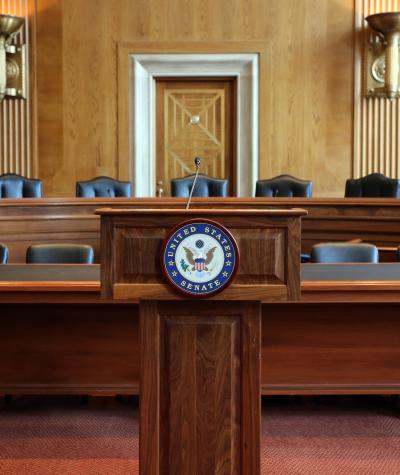To ensure integrity in Congress, the U.S. Constitution gives the House and the Senate authority to establish ethics rules and impose discipline for improper behavior in each chamber. This broad mandate has produced numerous laws that provide guardrails against corruption, including mandatory financial disclosures, limitations on fundraising practices, restrictions on gifts, and more.
These rules have been essential to promoting public trust in Congress by fulfilling voters’ right to know whether their elected officials are acting both ethically and transparently. However, these rules also remain imperfect and the responsibility for calling for the enforcement of existing regulations, as well as proposing more effective policies, often falls to the public.
That is why Campaign Legal Center (CLC) has released a new report on how to enhance ethics enforcement in the U.S. Senate. The Senate currently relies on an ineffective system of self-policing where lawmakers are responsible for both investigating alleged wrongdoing and applying the rules against their own colleagues.
This approach has proven flawed, with the U.S. Senate Select Committee on Ethics (Senate Ethics Committee) unable to fulfill its mission in the face of partisanship, the discomfort of investigating one’s coworkers, and the desire for collegiality among lawmakers whose political support may be needed later. As a result, senators have been able to break the rules with little to no consequences.
A recent analysis found that of the 1,523 complaints sent to the Senate Ethics Committee since 2007, zero resulted in any formal disciplinary sanctions. Stunningly, this means that the Senate Ethics Committee has not meaningfully punished anyone in more than fifteen years.
CLC’s report contrasts the Senate’s current ethics process with the more effective enforcement system utilized by the House of Representatives. In the House, lawmakers have established an independent Office of Congressional Ethics (OCE) to conduct preliminary fact-finding and make referrals for disciplinary action to the U.S. House Committee on Ethics (House Ethics Committee).
This comparison demonstrates both why and how the Senate should enhance its enforcement process by creating an independent office for ethics investigations akin to OCE.
OCE is a nonpartisan entity that can review ethics complaints and conduct initial investigations into potential misconduct by representatives. It is led by private citizens who cannot serve in Congress, work as lobbyists, or be employed by the federal government. It also employs an expert staff trained to conduct impartial fact-finding and draft reports that are generally released to the public.
Although lawmakers on the House Ethics Committee retain ultimate authority over adjudicatory decisions, the empowerment of an independent entity to conduct its own inquiries means that representatives cannot turn a blind eye to misdeeds by their colleagues. Impartial investigators can dutifully search where the evidence leads, without regard for partisanship or concern for collegiality.
In addition, the fact that OCE reports are generally released to the public ensures that evidence of wrongdoing sees the light of day. This promotes greater accountability because the House Ethics Committee is less likely to ignore a meritorious complaint if its members know their constituents will be able to learn about the violation.
Potential rulebreakers are also less likely to misbehave if the risk of enforcement action is meaningful, and if they know that their voters will hear about their conduct.
CLC’s new report breaks down each chamber’s ethics enforcement process in greater detail, provides examples of how each system works in practice, and quantitatively compares the effectiveness of both approaches. In short, it makes a comprehensive case for why the Senate should immediately create its own independent entity for ethics investigations.
In addition, the report describes how OCE can and should be improved, offering a checklist of reforms for the House to also consider.
The American public deserves effective ethics enforcement in both chambers of Congress, and across all branches of government. But for the Senate in particular, the public can no longer rely on lawmakers to self-police misconduct.
Without a major change, voters cannot be sure that senators will prioritize the needs of their constituents over their own personal and financial gain, or the wishes of donors and special interests.
The best way to reduce voters' concerns about the behavior of our elected officials and promote accountability is for the Senate to immediately create an independent office for ethics investigations. This reform will not only help lawmakers fulfill their constitutional responsibility to ensure proper behavior in Congress, but also strengthen American democracy overall.
Read CLC’s full report, “Enhancing Ethics Enforcement in the U.S. Senate,” here.

